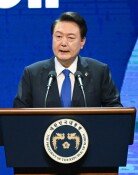ROK-US alliance marks 70th year as evolving axis of future and prosperity
ROK-US alliance marks 70th year as evolving axis of future and prosperity
Posted October. 04, 2023 08:01,
Updated October. 04, 2023 08:01
On the first day of October, the ROK-US Mutual Defense Treaty, the bedrock of the ROK-US alliance, celebrated its 70th anniversary. Both countries have been commemorating this milestone with various seminars and academic events. Former ROK-US Combined Forces Commanders conveyed their congratulations, saying, “The ROK-US alliance is a source of pride for the entire world and a cornerstone of hope.” Foreign Ministers from both nations have reaffirmed their commitment to strengthening cooperation, labeling it as “an essential global partnership” and “the most robust and successful alliance.”
The history of South Korea's growth and development was nearly impossible to explain without mentioning the ROK-US alliance. Amidst North Korea's constant threat of invasion, South Korea's rapid democratization and industrialization were made possible by unwavering security support from the United States. The ROK-US alliance has been the bedrock that has safeguarded peace on the Korean Peninsula in the face of Pyongyang's relentless pursuit of nuclear development, ultimately propelling South Korea from the ruins of war to becoming one of the world's 10 largest economies. In a recent perception survey of ROK-US relations, the fact that over 90% of respondents answered that the alliance is important and that the United States would support South Korea in a similar situation underscores the profound trust the Korean people have in this alliance.
The ROK-US alliance is now evolving beyond traditional military security into a comprehensive partnership encompassing economics, technology, and more. Cooperation discussions to strengthen the global supply chain of critical industries such as semiconductors and electric vehicle batteries are tighter than ever. The two nations are also actively discussing the concrete implementation of advanced emerging technology cooperation, including bio-tech, space, and quantum computing, as promised during their summit meetings.
While the ROK-US alliance has reached unprecedented levels of excellence, the challenges and tasks ahead are more demanding than ever. North Korea, with its constitutional declaration of "nuclearization," is intensifying its efforts in partnership with Russia to acquire reconnaissance satellite and long-range missile technologies. As the Ukraine-Russia conflict prolongs, the framework of a new Cold War strengthens, and security concerns persist in the Taiwan Strait and the South China Sea. Amidst the technological rivalry between the U.S. and China, there is a growing trend of nationalistic policies. Complex crises that interweave global security and economics extend beyond Northeast Asia, posing significant challenges.
Now, the ROK-US alliance faces a new task of elevating the alliance into a more robust framework for future cooperation, building on the commitments made in the "Washington Declaration" to enhance deterrence and forge a stronger foothold of alliance. Both nations must ensure the continuity of cooperation, despite domestic political changes, such as presidential elections and leadership transitions, to prevent the alliance from being shaken. Strengthening diplomatic capabilities within the alliance, which can assert our demands confidently while seeking optimal points of agreement for mutual benefit, is also imperative. We look forward to another 70 years of partnership as a core axis for future peace and prosperity.







